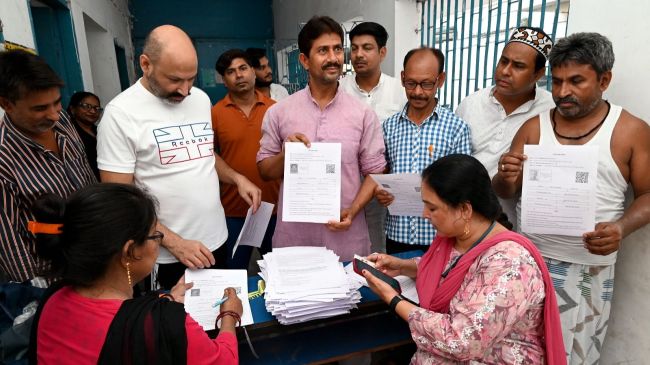Final electoral roll | Bihar SIR: Voter list shrinks 6% to 7.42 Cr, citizenship no factor in 99% deletions
EC told Supreme Court it could seek proof of citizenship and put the onus on voters in a Special Intensive Revision — but with non-citizens barely a factor in Bihar's final voter count, the high bar for inclusion is now in question.
 The Election Commission has removed 50 lakh names from Bihar's voter list, resulting in a 6% decrease in the total number of electors. (Express Photo by Rahul Sharma)
The Election Commission has removed 50 lakh names from Bihar's voter list, resulting in a 6% decrease in the total number of electors. (Express Photo by Rahul Sharma) THE FINAL Bihar voter list published Tuesday has 7.42 crore voters, about 6 per cent less than 7.89 crore as on June 24 this year, the day the Election Commission of India (ECI) announced a three-month Special Intensive Revision (SIR) in the state.
While the Election Commission and Bihar Chief Electoral Officer (CEO) did not disclose how many foreigners were removed from the electoral roll, sources in Bihar told The Indian Express that nearly 99 per cent of the deletions were on account of death, permanent migration and duplication. This flies in the face of the ECI’s defence of the SIR also as a citizenship verification drive.
In the Supreme Court, the ECI had argued it was within its powers to seek proof of citizenship and justified placing the burden of proof on electors, but the outcome shows that non-citizens or foreigners were barely a factor — raising questions on why the bar for inclusion was set so high in the first place.
In the SIR, as many as 68.6 lakh names were struck off, of which 65 lakh were removed when the draft roll was published on August 1, and another 3.66 lakh during the claims and objections stage — the period when citizens can contest deletions or seek corrections in the draft roll. Alongside, 21.53 lakh new electors were added.
While the EC did not release the number of the male and female electors, the percentage of women electors out of total electors reduced from 47.75% in January to 47.15% after SIR, the sources said.
Of the 65 lakh names deleted at the draft stage, 22 lakh were marked dead, 36 lakh were shown as permanently migrated or absent, and 7 lakh were already enrolled elsewhere. In the final roll, the sources said that of the 3.66 lakh further deletions, over 2 lakh were due to migration, around 60,000 to death, and 80,000 to duplication (enrolled in two places).
This essentially leaves a negligible percentage, if any, of foreigners removed from the list, sources in the Bihar CEO office said. When the SIR was announced in June, Opposition parties criticised the Election Commission alleging it was breaking precedent and attempting a citizenship check.
In a statement on the end of the SIR, the Election Commission said the “exercise was carried out in line with Article 326 of Constitution and ECI’s motto of ‘no eligible voter to be left out, and no ineligible person to be included in the electoral rolls’”. The commission added that anyone aggrieved by the process could file the first appeal before the District Magistrate and a second appeal before the Chief Electoral Officer as per the Representation of the People Act, 1950.
Based on the Bihar experience, the Commission is expected to review the exercise and decide on the method and timing of rolling out the SIR in the rest of the country. Although the poll panel held a meeting of all state CEOs on September 10, where a presentation was made on the Bihar exercise and feedback was sought on the list of documents for proof of eligibility, the EC is yet to announce the schedule for the nationwide intensive revision.
The EC had on June 24 ordered an SIR for the whole country, but started with Bihar as Assembly elections are due in the state in November. As per the order, all existing 7.89 crore electors were required to fill enumeration forms and all those registered after 2003, when the last intensive revision was held in the state, were required to submit documents to prove their eligibility, including citizenship.
Unlike the routine “summary revision” — an annual update where draft rolls are published and citizens file claims for inclusion, deletion or correction — an intensive revision is a far more elaborate exercise. It involves a complete, house-to-house enumeration to freshly prepare the rolls from scratch, without relying on existing lists. The EC usually resorts to this when it finds the rolls outdated or unreliable, such as ahead of major elections or after a delimitation exercise.
Explaining its decision to prepare the roll afresh this year, instead of the annual revisions that have been the practice for the past two decades, the EC had said on June 24: “Various reasons such as rapid urbanisation, frequent migration, young citizens becoming eligible to vote, non-reporting of deaths and inclusion of the names of foreign illegal immigrants have necessitated the conduct of an intensive revision so as to ensure integrity and preparation of error-free electoral rolls.”
There was widespread political opposition and significant confusion on the ground in the poll-bound state over the ECI’s new requirement that even existing electors, if enrolled after 2003, must furnish documentary proof out of a list of 11 to establish their date and/ or place of birth, which is then used to determine citizenship.
According to the EC’s order, all those born before July 1, 1987 were required to submit documents proving their own date and/ or place of birth; all those born between July 1, 1987 and December 2, 2004, were required to submit documents for themselves and one parent; and all those born after December 2, 2004, were required to submit the documents for themselves and both parents. These categories were as per the requirements under the Citizenship Act, 1955.
With the exercise triggering concerns over its potential to disenfranchise large numbers of electors, the Commission’s decision was challenged in the Supreme Court through a batch of petitions questioning both its authority to conduct a citizenship check of existing voters and the procedure adopted in the SIR. Article 326 provides that only Indian citizens above the age of 18 can be registered as electors. However, the current enrolment form, Form 6, does not require proof of citizenship.
Although the Supreme Court did not stay the exercise, it raised the bar for exclusion by directing that Aadhaar be included as the “12th document” to establish proof of identity for the revision.
Bihar Voter List Revision 2025: Summary
| Category | Number | Details |
|---|---|---|
| Names Deleted | 65 lakh | Initial deletions at draft roll stage |
| Additional Deleted | 3.66 lakh | Deleted after draft roll publication |
| Total Deletions | 68.5 lakh | Combined (initial + additional) |
| Names Added | 21.53 lakh | New electors before final roll |
| Net Change | -47 lakh | Total drop in voter count (deletions minus additions) |






